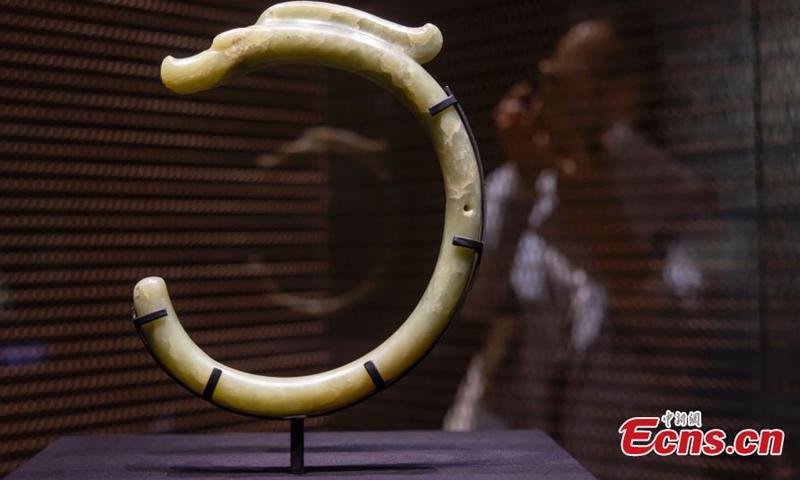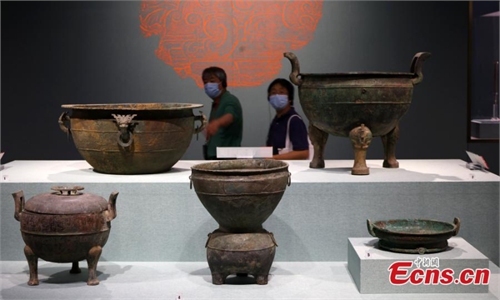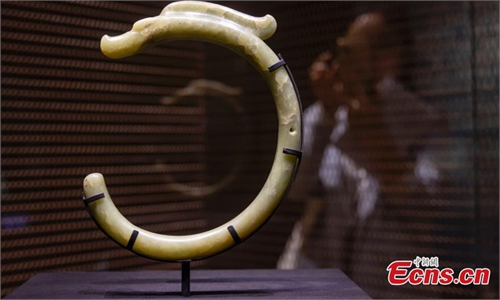ARTS / CULTURE & LEISURE
Nanjing exhibition explores 10,000 years of jade culture

A jade artifact is on display at Nanjing Museum in east China's Jiangsu Province, Nov. 2, 2023. (Photo: China News Service)
In celebration of its 90th anniversary, the Nanjing Museum in East China's Jiangsu Province has opened a jade-themed exhibition with more than 600 exhibits exploring the country's 10,000 years of jade culture.Held by the Nanjing Museum and drawing on collections from 40 archaeological and cultural institutions across China, the exhibition showcases a diverse array of jade artifacts, spanning a period of nearly 10,000 years.
"Among the more than 600 exhibits, at least one-third are national-level cultural relics, and more than half are treasured pieces at various museums," said Gao Bo, a staff member of the museum.
The exhibition is divided into three sections, each exploring a different facet of the relationship between jade and Chinese civilization. The first section mainly revolves around the cultural landscape of prehistoric jade, telling how jade artifacts helped integrate and promote China's prehistoric civilization.
Among the highlights of the first section is a jade ring unearthed from the Xiaonanshan Ruins in Raohe county, Northeast China's Heilongjiang Province. Dating back around 9,000 years, this ancient piece of jade is believed to be one of the earliest known examples of the usage of jade in China.
The second section of the exhibition centers on the participation of jade rituals in the formation of the state, the establishment of community spirit, and the development of jade as a metaphor for virtue, highlighting the significance of jade in the state system and individual spirituality.
One remarkable artifact on display in this section is a C-shaped jade dragon, unearthed from a Hongshan Neolithic culture site dating back 5,000 years, the dragon has a long cylindrical bent into a C-shaped rainbow curve.
According to Zuo Jun, a staff member of the museum, it was a ritual jade and is considered to be the original model for the dragon totem in China. It is one of the earliest jade dragons found in China and also the largest C-shaped jade dragon ever found.
This section also showcases a range of jade artifacts from the 5,000-year-old Liangzhu culture, including representations of deities and symbols of authority, such as scepters. These objects offer insight into the social status, political organization, and religious beliefs of ancient Chinese communities.
"During the Liangzhu period, jade was transformed from an object of beauty to being a socialized, ritualized and religious product," Zuo said.
The third section examines the development of jade from the Three Kingdoms period (220-280) to the Ming (1368-1644) and Qing (1644-1911) dynasties, presenting the peak of the development of Chinese jade civilization in terms of materials, craftsmanship, cultural meaning and other aspects.
An exquisite jadeite carving of a bunch of grape displayed in the third section shows the delicate and fine jade grinding skills of the Qing Dynasty. The curator introduced that in the Qing Dynasty, jade carving reached its peak, thereby occupying a pivotal position in the history of ancient Chinese jade.
Jade culture is a witness to the continuity, innovation, unity, inclusiveness and gentleness of Chinese civilization, showing the internal drive and profound meaning of today's Chinese path to modernization, Gao said.



